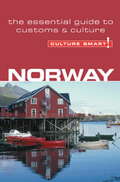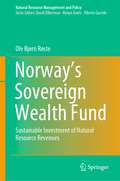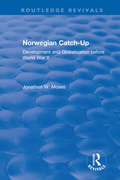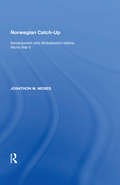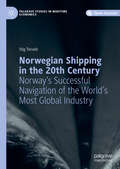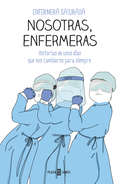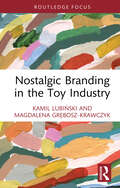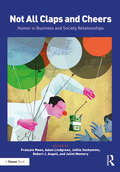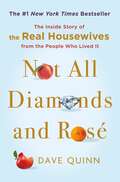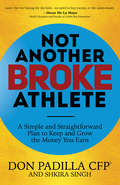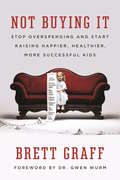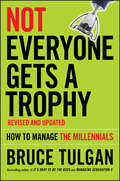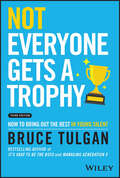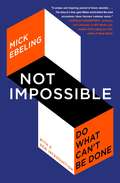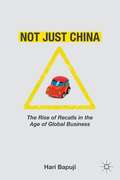- Table View
- List View
Norton Co.: Strategic Planning for Diversified Business Operations
by Francis J. AguilarDescribes an elaborate approach to strategic planning for diversified business operations. Includes the use of the BCG experience curve and growth share matrices and of PIMS profit-factor data. (Both sets of ideas are described in appendices to the case.) Also describes a specific strategic problem concerning the coated abrasives business requiring a management decision. Permits students to describe what action Norton should take with respect to its coated abrasives business and also to evaluate the Norton strategic planning system.
Norway - Culture Smart!
by Linda MarchCulture Smart! provides essential information on attitudes, beliefs and behavior in different countries, ensuring that you arrive at your destination aware of basic manners, common courtesies, and sensitive issues. These concise guides tell you what to expect, how to behave, and how to establish a rapport with your hosts. This inside knowledge will enable you to steer clear of embarrassing gaffes and mistakes, feel confident in unfamiliar situations, and develop trust, friendships, and successful business relationships.Culture Smart! offers illuminating insights into the culture and society of a particular country. It will help you to turn your visit-whether on business or for pleasure-into a memorable and enriching experience. Contents include* customs, values, and traditions* historical, religious, and political background* life at home* leisure, social, and cultural life* eating and drinking* do's, don'ts, and taboos* business practices* communication, spoken and unspoken"Culture Smart has come to the rescue of hapless travellers." Sunday Times Travel"... the perfect introduction to the weird, wonderful and downright odd quirks and customs of various countries." Global Travel"...full of fascinating-as well as common-sense-tips to help you avoid embarrassing faux pas." Observer"...as useful as they are entertaining." Easyjet Magazine"...offer glimpses into the psyche of a faraway world." New York Times
Norway Sells Wal-Mart
by Robert C. PozenIn June 2006, Norway's Pension Fund decided to divest its position in Wal-Mart Stores, Inc. after an investigation by the Fund's Ethics Council. According to a spokesperson of Norway's Finance Ministry, "The recommendation to exclude Wal-Mart cites serious and systematic violations of human rights and labor rights." Before making its recommendation to the Ministry to divest Wal-Mart, the Council sent its findings to the retailer for comment, but received no response. While Wal-Mart did not respond, the company had taken several steps to strengthen its ethical standards worldwide in recent years.
Norway: The Embarrassment of Riches
by Sophus A ReinertIn early 2013, Norway was by many accounts the world's most developed country; it topped various indices for everything from democracy to happiness, had a comprehensive welfare state, and massive oil revenues endowed it with a substantial, and growing, Sovereign Wealth Fund. The governing coalition, anchored in the historically near-hegemonic Labour Party, had embraced peacemaking activities abroad and increasingly freer immigration policies at home, pursuing an aim of "liberal multiculturalism" that had invited both accolades and increasingly hostile criticism. More recent years had seen a change of government and falling oil prices, but Norway continued to top world development indexes. Now, in 2017, however, citizens of the country questioned both the government's decision to turn a blind eye to ethical considerations in its pursuit of exports, and to environmental concerns in drilling for ever more oil and gas in fragile arctic ecosystems. Was there such thing as enough?
Norway’s Sovereign Wealth Fund: Sustainable Investment of Natural Resource Revenues (Natural Resource Management and Policy #54)
by Ole Bjørn RøsteThis book elaborates on how Norway has managed to convert a large fraction of its endowment of hydrocarbons below the seabed of Norwegian waters into financial wealth, invested in the world’s capital markets. Further, it explains how this wealth is managed. Under the current guidelines, only the assessed return on investment may be allotted to public budgets. This ensures that the wealth will benefit both current and future generations. The capital is gathered in the Sovereign Wealth Fund – or State Pension Fund Global (SPF-G) –, which is intended to maximize capital value without exceeding acceptable risks. The book offers new insights into the history and management of the fund, examines its successes,and discusses future challenges. Given its scope, it appeals to scholars of economics, finance and political science, and to anyone interested in the sustainable investment of natural resource-based revenues.
Norwegian Catch-Up: Development and Globalization before World War II (Routledge Revivals Ser.)
by Jonathon W. Moses'Norwegian Catch-Up' looks at the early Norwegian economic trajectory in the light of its external commitments and opportunities. Detailing Norway's economic performance relative to other countries at a time characterized by globalization, it has a particular focus on the role of international trade, investment and migration. The book examines how a small open state adapted successfully to the demands of (and opportunities provided by) a global market place. Not only did Norway manage an impressive economic record, but it developed concomitantly a strong and articulate labor movement and resilient democratic institutions. In short, the Norwegian example provides hope for development in a context of globalization. This text provides the student with a pioneering new vantage point for understanding the nature and scope of today's globalization and its effect on economic (and political) development. It also provides a historical reflection on the liberal antecedent of modern social democracy.
Norwegian Catch-Up: Development and Globalization before World War II (Routledge Revivals Ser.)
by Jonathon W. Moses'Norwegian Catch-Up' looks at the early Norwegian economic trajectory in the light of its external commitments and opportunities. Detailing Norway's economic performance relative to other countries at a time characterized by globalization, it has a particular focus on the role of international trade, investment and migration. The book examines how a small open state adapted successfully to the demands of (and opportunities provided by) a global market place. Not only did Norway manage an impressive economic record, but it developed concomitantly a strong and articulate labor movement and resilient democratic institutions. In short, the Norwegian example provides hope for development in a context of globalization. This text provides the student with a pioneering new vantage point for understanding the nature and scope of today's globalization and its effect on economic (and political) development. It also provides a historical reflection on the liberal antecedent of modern social democracy.
Norwegian Shipping in the 20th Century: Norway's Successful Navigation of the World's Most Global Industry (Palgrave Studies in Maritime Economics)
by Stig TenoldThis book is open access under a CC BY NC ND 4.0 license. This open access book discusses how Norwegian shipping companies played a crucial role in global shipping markets in the 20th century, at times transporting more than ten per cent of world seaborne trade. Chapters explore how Norway managed to remain competitive, despite being a high labour-cost country in an industry with global competition. Among the features that are emphasised are market developments, business strategies and political decisions The Norwegian experience was shaped by the main breaking points in 20th century world history, such as the two world wars, and by long-term trends, such as globalization and liberalization. The shipping companies introduced technological and organizational innovations to build or maintain a competitive advantage in a rapidly changing world. The growing importance of offshore petroleum exploration in the North Sea from the 1970s was both a threat and an opportunity to the shipping companies. By adapting both business strategies and the political regime to the new circumstances, the Norwegian shipping sector managed to maintain a leading position internationally.
Nosotras, enfermeras: Historias de unos días que nos cambiaron para siempre
by Enfermera SaturadaEl testimonio de cómo las enfermeras vivimos los días en que un virus paralizó el mundo en poco más de tres meses y sumió a España en la peor pandemia del siglo XXI. Esta es la historia de una enfermera que luchó contra el coronavirus en primera línea, armada con una bolsa de basura y una mascarilla reutilizada. Pero, en realidad, es también la de todos los enfermeros y las enfermeras que plantaron cara al virus, esos a los que la sociedad llamó héroes, y por quienes aplaudía a las ocho, mientras ellos y ellas vivían con el miedo pegado a su espalda. Es el testimonio de sus lágrimas, temores y sacrificios, y a la vez de la inmensa felicidad que sentían cada vez que apagaban un respirador y entregaban el alta a un paciente. «El primer paciente que atendí con la COVID-19 fue el 5 de marzo de 2020. Creo que esta será una de las fechas que recordaré toda la vida. Hasta ese día, hasta el mismo instante en que tienes frente a ti a una persona contagiada con el virus que está causando tantos estragos, mis compañeras y yo seguíamos pensando que no nos tocaría. Supongo que una, como mecanismo de defensa, tiende a negar la realidad hasta que la tiene a dos metros de distancia y con un informe del laboratorio con la palabra POSITIVO escrita en mayúsculas. A pesar de todo, y aunque los casos en Italia se contaban ya por miles, seguíamos aferrándonos al hecho de que ese día en nuestro país los confirmados apenas superaban los doscientos y en las plantas de mi hospital los casos no llegaban ni a media docena. No podíamos ni imaginar que acabaríamos ingresando, únicamente en nuestra unidad, a más de trescientos pacientes en solo dos meses. Que en toda España habría más de doscientos cincuenta mil casos confirmados, que en apenas tres meses más de cincuenta mil compañeros y compañeras se contagiarían o que nos dejarían para siempre más de veintiocho mil personas según los datos oficiales. Con este libro pretendo plasmar, de la forma más fiel posible a la realidad, todas las historias acontecidas durante estos meses para que, a pesar del paso de los años, no se pierdan en el olvido, se reescriban o se desdibujen. Así, quienes no lo han vivido tan de cerca, podrán ser más conscientes de lo que sucedió.» «La crónica de un enorme esfuerzo profesional, escrita desde la solidaridad y la angustia. Leerlo es un acto de gratitud». PEPA FERNÁNDEZ.RNE
Nosotros, el pueblo: acordando una democracia más profunda
by Romina P. Piscione John Buck Sharon VillinesLa segunda edición se publicó el 7 de septiembre de 2017. Sociocracia es un método de gobernanza y diseño organizacional basado en la colaboración y la toma de decisiones por consenso. El método evolucionó a partir de los métodos de toma de decisiones de Quaker, y luego se integró con la cibernética y el pensamiento sistémico para incorporarlo al mundo corporativo. El libro incluye el texto que explica la historia y la teoría, 3 escritos originales de sociólogos y empresarios que desarrollaron las ideas, ejemplos de estatutos para empresas y organizaciones sin fines de lucro, guías para el uso de las técnicas, un glosario, bibliografía e índice. Este es el único libro sobre este tema y debería estar circulando durante mucho tiempo.
Nossa vez de poluir
by Ronald RwakigumbaTurn to Pollute usa o título de um argumento frequentemente narrado durante as negociações sobre mudanças climáticas, onde as nações menos desenvolvidas postulam que, dado que as nações desenvolvidas causaram a maior parte da poluição no passado, elas têm a obrigação histórica de arcar com os custos associados à mitigação ou adaptação às mudanças climáticas. Simultaneamente, eles também argumentam que, como a poluição através da industrialização é uma consequência inevitável para o desenvolvimento, as nações em desenvolvimento têm de poluir para alcançar o crescimento económico. Dizer o contrário não é novidade, o que falta no discurso é comunicar claramente o crescimento verde como uma alternativa que concilia exactamente os aparentes opostos do desenvolvimento entre objectivos ecológicos e sociais. O que também tem faltado nos discursos é uma abordagem multissetorial ao desenvolvimento sustentável, onde diferentes facetas foram abordadas isoladamente, perdendo a oportunidade que surge de uma abordagem intersetorial. Esta é a jornada apresentada nas 100 páginas de 'Nossa vez de poluir' Começando com um mergulho profundo na sustentabilidade, o livro prossegue introduzindo o valor do ambiente e fornecendo formas de corrigir o que pode ter corrido mal na precificação do ambiente, seguida de uma narração geral da acção climática - ou será inacção? Não menos importante, a energia, que desempenha um papel fundamental no abastecimento das famílias e das economias, requer uma boa análise, que é fornecida num dos últimos capítulos. O que diferencia este livro é a visão holística de conectar os diferentes pontos e traçar um quadro mais completo de como avançamos, e isso está escrito no capítulo final do desenvolvimento sustentável com exemplos, lições e reflexões. Em última análise, estamos nisto juntos, na nossa casa partilhada, a Terra, e que melhor maneira de comunica
Nostalgia Marketing: Rekindling the Past to Influence Consumer Choices
by Marco PichierriThe book examines the use of nostalgia as a marketing lever that can potentially affect consumer behavior. Beginning with a thorough examination of nostalgia as a construct, the book then presents and discusses four studies to show the possible effects of nostalgia in the context of sport marketing, charitable giving, sustainable consumption and sports tourism. The book is a valuable resource for scholars and those interested in discovering advancements in consumer research. In addition, it offers benefits to marketers and practitioners seeking to include nostalgic stimuli in their advertising communications.
Nostalgic Branding in the Toy Industry (Routledge Focus on Business and Management)
by Kamil Lubiński Magdalena Grębosz-KrawczykIn recent years, there has been a clear tendency to undertake marketing initiatives that appeal to consumers’ emotions, experiences, and memories. This book explores the essence of nostalgic branding by presenting the concept of nostalgia, analysing nostalgic attitudes and consumer behaviour, and illustrating how to position nostalgic brands using the toy market as an example.The book explores the role nostalgia plays in our lives, what types of nostalgic brands we find on the market, how nostalgia influences consumer attitudes and behaviour, and how to position brands using nostalgia. It shows readers how memories influence their behaviour and provides managers with insights on how to successfully manage nostalgic brands, not only in the toy industry. Using their own research results, the authors demonstrate how to use the fundamental emotion known as nostalgia for successful brand positioning.Nostalgic Branding in the Toy Industry is addressed primarily to scholars and doctoral students conducting research in the area of brand management, marketing, and consumer behaviour.
Nostalgie als Chance für die Markenpositionierung: Wie positive Erinnerungen Marken differenzieren können (essentials)
by Stefanie Jensen Martin OhlweinStefanie Jensen und Martin Ohlwein beleuchten in diesem essential die Frage, ob Marken, mit denen eine besondere und positive Erinnerung verbunden wird, über einen Nostalgieansatz vermarktet werden sollten – gerade bei älteren Konsumenten beeinflusst Markennostalgie Einstellungen, Präferenzen und sogar die finale Kaufentscheidung positiv. Gilt dies auch für die für Markenartikler hochinteressante Zielgruppe der Generation Y? Die Autoren stellen die Markennostalgie in den Mittelpunkt, die sich aus persönlichen und historischen Erinnerungen sowie dem wahrgenommenen Alter der Marke zusammensetzt, und zeigen auf, wie in Zeiten immer kurzlebigerer Trends Marken wie Haribo und Nivea durch einen bewusst hergestellten Bezug zur eigenen Vergangenheit bei jüngeren wie älteren Konsumenten punkten können.
Nostalgie als Stimmungsaufheller: Eine Einführung in die psychologischen Auswirkungen des nostalgischen Erinnerns (essentials)
by Gernot Schiefer Laura GehrleinDieses essential gibt einen kompakten Überblick über Nostalgie und welche Wirkungen nostalgisches Erinnern auf die eigene Stimmung und weitere psychische Funktionen hat. Ausgehend von einem vorwissenschaftlichen Verständnis des Konstrukts wird gezeigt, wie sich Nostalgie verändert hat und was die wesentlichen Inhalte persönlicher nostalgischer Erinnerungen sind. Die Autor*innen zeigen, wie Nostalgie genutzt werden kann, um positive Auswirkungen auf die eigene Befindlichkeit zu erzielen. Es werden auch Grenzen von Nostalgie dargestellt und gezeigt, wann und für wen nostalgische „Zeitreisen“ nicht vorteilhaft sind. Zudem werden Auswirkungen der Nostalgie auf depressive Personen analysiert.
Not Accountable: Rethinking the Constitutionality of Public Employee Unions
by Philip K. Howard&“Elected leaders come and go, but public unions just say no.&” Hiding in plain sight is a fatal defect of modern democracy. Public employee unions have a death grip on the operating machinery of government. Schools can&’t work, bad cops can&’t be fired, and politicians sell their souls for union support. With this searing five-point indictment, Philip K. Howard argues that union controls have disempowered elected executives and should be unconstitutional. Union power in government happened almost by accident in the 1960s, ostensibly to give public unions the same bargaining rights as trade unions. But government bargaining is not about dividing profits, but making political choices about public priorities. Moreover, the political nature of decision-making allowed unions to provide campaign support to friendly officials. Public bargaining became collusive. The unions brag about it: &“We elect our own bosses.&” Sitting on both sides of the bargaining table has allowed public unions to turn the democratic hierarchy upside down. Elected officials answer to public employees. Basic tools of good government have been eliminated. There&’s no accountability, detailed union entitlements make government largely unmanageable and unaffordable, and public policies are driven by what is good for public employees, not what is good for the public. Public unions keep it that way by brute political force—harnessing the huge cohort of public employees into a political force dedicated to preventing the reform of government. The solution, Howard argues, is not political but constitutional. America&’s republican form of government requires an executive branch that is empowered to implement public policies, not one shackled to union controls. Public employees have a fiduciary duty to serve the public and should not be allowed to organize politically to harm the public. This short book could unlock a door to fixing a broken democracy.Common Good (www.commongood.org) is a nonpartisan reform coalition to simplify government and restore common sense in daily decisions. It proposes a new governing vision: replace red tape with individual accountability. Its Founder and Chair is lawyer and author Philip K. Howard.
Not All Claps and Cheers: Humor in Business and Society Relationships
by Adam Lindgreen Joelle Vanhamme Francois Maon Robert J. Angell Juliet MemeryScholars from various disciplines have studied humor since antiquity. Yet, over the centuries, these researchers have also struggled to conceptualize a viable, well-accepted notion of humor. Beyond pleasure and amusement, people use humor for a variety of social functions. On the one hand, humor can cause others to like the humorous source more, attract regard, ease conversations, promote expression and the exchange of ideas, introduce new topics of discussion, or smooth interactions. On the other hand, in aggressive forms, humor can halt verbal interactions, modify the usual rules of conversation, communicate critiques, or contribute to the creation of subversive environments. Not All Claps and Cheers: Humor in Business and Society Relationships is an original research anthology that considers different angles from which to address the use of humor by individuals, groups and business actors in their interactions within, around, and across organizations—that is, at the interfaces of business and society. Accordingly, the research anthology is organized in four sections—"Humor, Business and Society," "From Society to Business: Humor’s Use and Roles in Activist Movements," "From Business to Society: Humor’s Use and Roles in Marketing, Corporate Communications, and Public Relations," and "Society within Business: Humor’s Use and Roles in the Workplace and in Organizations." This ground-breaking research anthology draws on material from marketing, communications, human resources and stakeholder theory to throw light on this poorly understood facet of human business behavior.
Not All Diamonds and Rosé: The Inside Story of The Real Housewives from the People Who Lived It
by Dave QuinnTHE INSTANT #1 NEW YORK TIMES BESTSELLER! <p><p> Dave Quinn's Not All Diamonds and Rosé is the definitive oral history of the hit television franchise, from its unlikely start in the gated communities of Orange County to the pop culture behemoth it has become—spanning nine cities, hundreds of cast members, and millions of fans. <p><p> What is it really like to be a housewife? We all want to know, but only the women we love to watch and the people who make the show have the whole story. Well, listen in close, because they’re about to tell all. <p><p> Nearly all the wives, producers, and network executives, as well as Andy Cohen himself, are on the record, unfiltered and unvarnished about what it really takes to have a tagline. This is your VIP pass to the lives behind the glam squads, testimonials, and tabloid feuds. <p><p> Life’s not all diamonds and rosé, but the truth is so much better, isn’t it?
Not Another Broke Athlete: A Simple and Straightforward Plan to Keep and Grow the Money You Earn
by Don Padilla Shkira SinghNOW! Right now, is the time to be accountable and responsible for where you are financially, and more importantly spiritually and mentally. Not Another Broke Athlete is a spiritual awakening not only for athletes, but all human beings that want to break the "chains" of a poverty or scarcity mindset. Whether it's passed down from one&’s parents, grandparents, or great grandparents that have lived through bondages, holocausts, genocides, depressions, and or recessions: if they aren't aware then they will continue living in these vicious cycles, even if they are "rich" financially, which can lead to a "poor" unfulfilled life.Don Padilla&’s experience of going from getting kicked out of his home, being broke, almost bankrupt twice, near divorce and becoming a millionaire: and insights from Shkira Singh, Dr. James Verbrugge, James Malinchak, Oscar De La Hoya, Aaron Boone, Jacob Cruz, Dana Hammonds, David Meltzer, Joe Theisman, Warren Moon, Dr. Pat Allen, Dr. Mamiko Odegard and others, will provide the tools to break these cycles of a poverty or a scarcity mindset and lead you to a path to grow and protect your legacy.
Not Buying It: Stop Overspending and Start Raising Happier, Healthier, More Successful Kids
by Brett GraffParents will do just about anything to give their kids happy lives and successful futures. Unfortunately, the drive to give kids the best of everything leads to a financial strategy based in fear and competition, and results in millions of dollars worth of unnecessary purchases. Enough is enough. In Not Buying It, Brett Graff, the "Home Economist,” separates the truth about what parents need for their kids to succeed from the fiction perpetuated by ads, peer pressure, and internal fear. Graff shows how parents can save up to a million dollars by investing the money they would otherwise spend on overpriced and unnecessary purchases for their kids. Graff exposes the many ways that overspending can actually harm kids by encouraging narcissism and unhealthy habits. Her tips range from the everyday (understand when supposedly "organic" products aren't worth the extra dollars) to the long-term (consider investing in a smaller home for your family, which encourages intimacy and connection), making this a valuable manual for all stages of a parent’s life. An essential book for new parents as well as parenting veterans, Not Buying It is the definitive guide for families who want to separate the truth about raising kids from the hype.
Not Everyone Gets A Trophy
by Bruce TulganThis book will frame Generation Y (children born between 1978-1991) for corporate leaders and managers at time when the corporate world is desperate to recruit and retain worked in this age group. It will debunk dozens of myths, including that young employees have no sense of loyalty, won't do grunt work, won't take direction, want to interact only with computers, and are only about money.This book will make a unique contribution in four key ways:It will disprove the idea that the key to recruiting, retaining, and managing this generation is to somehow make the workplace more "fun." To the contrary, Tulgan argues that the key to winning the respect of this generation, and getting the best effort out of them, is to carefully manage their expectations by never downplaying any negative aspect of a job.He will show managers how this Generation thinks transactionally in all negotiations. For them it's about what they will do for you today and what you will do for them today, not tomorrow, not five years from today, but today.He will explain why they have no interest in tying their futures to your corporation. But he will also make clear that they do have a well thought-out plan for themselves, one that requires that every job they take build up their skill sets, so they become more valuable employees for someone else--if and when you do not fulfill your end of the bargain, or drag your feet in doing so.But most of all, it will explain to corporate leaders that for this generation their personal life comes first, so that each job they take must accommodate itself to some need defined by their personal life. Tulgan argues that until you know the personal need the job can satisfy for a potential employee, you and the applicant may be talking past each other. Those needs are so beyond the imagination of most bosses that Tulgan devotes a third of the book to explaining how they affect the job decisions of this generation.
Not Everyone Gets a Trophy: How to Bring Out the Best in Young Talent
by Bruce TulganLearn the secrets of managing a unique and productive generation In the newly revised third edition of Not Everyone Gets a Trophy: How to Bring Out the Best in Young Talent, renowned management trainer and business advisor Bruce Tulgan reimagines how to engage with, develop, and retain millennial employees in a time of deep economic disruption. The book offers step-by-step best practices for getting millennials onboard and up-to-speed. You’ll learn how to provide them with the context they lack, teach them how to manage themselves and how to be managed, and turn the very best into new leaders. In the book, you’ll also find: A renewed focus on every millennial generation, including Generations X, Y, and Z. A new preface about the dramatic generational shift now taking place in the workforce Updated case studies and examples, as well as brand-new research on first-wave and second-wave millennialsAn essential handbook to maximizing the considerable potential of the millennial generations, Not Everyone Gets a Trophy: How to Bring Out the Best in Young Talent will earn a place in the libraries of executives, managers, HR professionals, and other business leaders interested in getting the most out of each and every one of their employees.
Not Impossible
by Mick EbelingWhat if you discovered by accident that you could change the world? Mick Ebeling--a film producer by trade, optimist by nature--set out to perform a simple act of kindness that quickly turned into a lifelong mission. In the process he discovered that he could, indeed, change the world--and this fascinating new book shows how you can, too.On the cutting edge of the new "Maker Movement"--an outgrowth of the "hackers" of a decade ago--Mick Ebeling has found ways to create new, simple, do-it-yourself technologies to help people surmount seemingly impossible odds. With a bunch of nuts and bolts, a few jimmy-rigged web cameras and a coat hanger, he got a paralyzed artist drawing again; for less than a hundred bucks, he made prosthetic arms for a boy whose arms had been blown off in the war in Sudan. From the beginning, Ebeling has dreamed big, but that doesn't mean his accomplishments have come easy. He's had to deal with the little voice in his head we all recognize--the skeptical, disbelieving part that says, "Sorry, this ain't happening." Yet he found the courage to ignore that voice and move on. And believe. And get things done. The first result was the Eyewriter, which Time magazine called one of the "Top 50 Inventions of 2010," a device that tracks eye movements and translates them into a cursor on a screen, then into paint on a canvas or a sculpture design. Later he travelled to the Sudan with the homemade prosthetic hand his team created and taught the locals to use the 3D printers--now every week another armless boy gets new working limbs and hands. Fascinating, inspiring, and bursting with optimism and new ideas, Not Impossible is a true testament to the power of determination. It will motivate you to accept the idea that all problems can be solved--and that you have the ability to change the world and make miracles happen.
Not Just China
by Hari BapujiThis book critically analyzes recalls of toys, carsand other products announced in the U. S. since 1974. By empirically examining the phenomenon from multiple perspectives, including design and manufacturing flaws; supply chain issues; number of injuries and how to manage recalls on a global scale.

